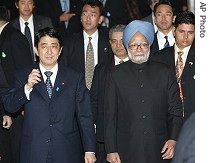-
(单词翻译:双击或拖选)
By Steve Herman
Tokyo
14 December 2006
Indian Prime Minister Manmohan Singh has called for India and Japan, Asia's two largest democracies, to construct an "arc of advantage and prosperity" across the continent. Analysts1 have said the two countries are interested in forming closer ties to counterbalance the growing economic and political might of China. VOA's Steve Herman reports from Tokyo, where Mr. Singh addressed a joint2 session of the Japanese parliament on Thursday.
 |
| Indian Prime Minister Manmohan Singh, right, and his Japanese counterpart Shinzo Abe, left, in Tokyo, 14 Dec. 2006 |
"Economic ties must be the background of our relationship, and a strong push is needed in this area," Singh said. "Our trade and investment ties are well below potential. This must change."
Mr. Singh came to Japan with more than simple economics in mind, however. New Delhi and Washington have just completed a controversial deal in which the U.S. will provide India with fuel and technology for India's peacetime energy program. But that agreement is subject to the approval of the 45-nation Nuclear Suppliers Group, of which Japan is a member.
After India carried out nuclear weapons tests in 1998, Japan imposed economic sanctions on the country. The Indian leader, noting both countries' growing requirements for energy, indirectly4 asked Japan on Thursday to forget the past, and approve the U.S. deal.
"Like Japan, India sees nuclear power as a viable5 and clean energy source to meet its growing energy requirements," he said.
He also and said the two must cooperate in assuring the security of energy supplies.
"We have, therefore, an equal stake in promoting defense6 cooperation, including the protection of sea lanes to secure our trade and energy flows," he said.
Mr. Singh barely mentioned China, except to note that China's trade with India is two times that of Japan's. He alluded7 to the mainland's growing might, however, speaking of the "changed international scenario," and he emphasized the values that separate China's totalitarianism from the Japanese and Indian democracies.
"We are two major Asian countries who share the universally respected values of freedom, democracy, respect for fundamental human rights and commitment to the rule of law," Singh said.
He said India and Japan must draw on these values to build "a strong partnership8 of the highest mutual9 importance."
 收听单词发音
收听单词发音
1
analysts

|
|
| 分析家,化验员( analyst的名词复数 ) | |
参考例句: |
|
|
|
2
joint

|
|
| adj.联合的,共同的;n.关节,接合处;v.连接,贴合 | |
参考例句: |
|
|
|
3
recipient

|
|
| a.接受的,感受性强的 n.接受者,感受者,容器 | |
参考例句: |
|
|
|
4
indirectly

|
|
| adv.间接地,不直接了当地 | |
参考例句: |
|
|
|
5
viable

|
|
| adj.可行的,切实可行的,能活下去的 | |
参考例句: |
|
|
|
6
defense

|
|
| n.防御,保卫;[pl.]防务工事;辩护,答辩 | |
参考例句: |
|
|
|
7
alluded

|
|
| 提及,暗指( allude的过去式和过去分词 ) | |
参考例句: |
|
|
|
8
partnership

|
|
| n.合作关系,伙伴关系 | |
参考例句: |
|
|
|
9
mutual

|
|
| adj.相互的,彼此的;共同的,共有的 | |
参考例句: |
|
|
|















